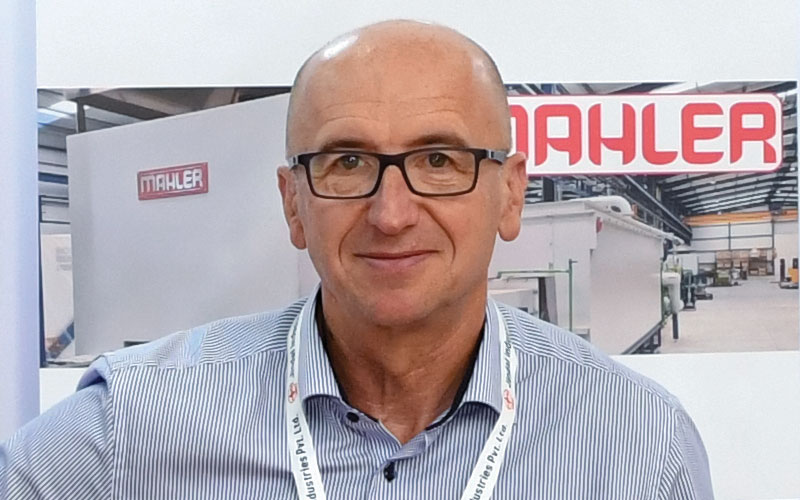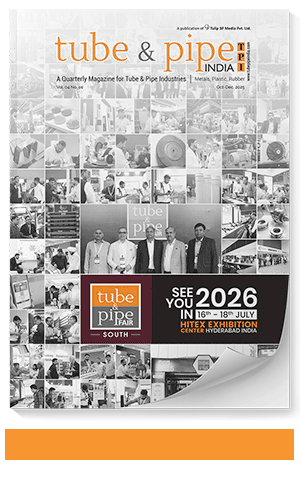Mahler GmbH Industrial Furnaces, the company that started in the 1920’s with the production of kitchen stoves became in the 50’s a manufacturer of industrial furnaces for the various heat treatments of metals, especially in a protective atmosphere. In 1980, it delivered its first sintering furnace with an incorporated endogas generator, thus laying the cornerstone for its success in the powder metal industry. Today, the German company’s reputation precedes its name. In India, it enjoys an elaborate customer base. Tube & Pipe India caught up with the company’s MD, Mr. Darius Geldner to delve into the company’s history to its market positioning, to mention some.

Tube & Pipe India: Please Walk us through the journey of Mahler since its inception.
Darius Geldner: The roots of Mahler, a company with tradition, date back to the year 1864. The company that started in the 1920’s with the production of kitchen stoves became in the 50’s a manufacturer of industrial furnaces for the various heat treatments of metals, especially in a protective atmosphere. In 1952 already we supplied the first protective gas furnace for bright annealing of 18/8 Cr-Ni steel. In 1964 the first protective gas continuous furnace with incorporated exogas generator to bright braze low carbon steel was supplied. In 1980 we delivered our first sintering furnace with an incorporated endogas generator, thus laying the cornerstone for our success in the powder metal industry. In 1991 we received the Award of Merit for “PM Processing Technology” from the European Powder Metal Association (EPMA) for the new development of a modern sintering furnace for sinter-hardening with rapid dewaxing zone, incorporated endogas generator and a gas quench unit. Over the decades the name Mahler became a term for innovative heat treatment and up-to-date and efficient furnace production.
TPI: What are the product lines you have been catering to the Indian market? And what motivated Mahler to enter the Indian market and how are you positioned today, in terms of market share?
DG: Our business in India started with bright Annealing furnaces. We had a good response, and we achieved this without any advertisement as all in the country; it was purely word of mouth. The products speak for themselves. If you look at the Indian market, the tube and pipe, it’s like a community, and within this community words spread, and they found our time-tested quality products. That’s how we made our footprint here, and now we want to expand it. We also deliver some sintering furnaces to south India for automobile and fastener spare parts or for auto-metallurgy parts. More than 20% of our furnace is in India.
TPI: What is something that makes Mahler very different in the competition or how do you stay ahead of others in the game?
DG: Bright annealing furnaces is our technology. When it comes to a simple bright annealing furnace, everyone can do this more or less successfully. But we are really able to make ‘bright’ annealing. It means the pipes will come really bright and not oxidized. When it comes to a very fast cooling, which is called jet cooler, when the pipes come out of the furnace at 1050 degrees, we cool them down very quickly with pure hydrogen. The thing is handling hydrogen is dangerous, it could explode, if you don’t know how to deal with it. The fact is that we are a unique company in the world equipped with this know-how or being able to control the flow of the hydrogen inside the furnace. So, we know when we blow this pure hydrogen, we are talking about 25,000 cubic meters per hour.
TPI: Who do you count as your major customers in India?
DG: Our biggest Indian customer is Ratnamani Metals and Tubes. The first time we delivered furnaces to them was in 2009, followed by more in 2012, 2013, and 2023. We also count Welspun Corporation and Remi Group as our good customers, and soon Jindal, Man Industries and Avon Tubetech will be in the list. We want to approach everyone in the Indian market. And what is quite surprising for me is people already know the name Mahler.
TPI: What is the normal lead time in manufacturing and delivery?
DG: We deliver quite fast. On average, it’s between six to eight months. Then again based on the priority, we can reschedule.
Also Read: Parth Equipment to Enhance Annual Capacity to 135 Machines in 2024
TPI: What are some of the challenges that you often face?
DG: The biggest, at present, is the challenges posed by the ongoing geopolitical crises. When shipping, we now have to avoid the usual routes, and this evidently means more time, and thus impacting our cost. Fluctuating exchange rate is also a major challenge. The fact that war in Ukraine has fueled inflation means we have to increase our price. We are, however, fortunate that our customers understand this, as we have been a reliable partner.
TPI: How do you see Mahler in the next five years?
DG: We are hopeful that our share in the Indian market will increase. I am saying this because I have been coming to this country since 2007, and have noticed a lot of positive changes. In this country of 1.43 billion, there must be a market for tubes, for pipes and for everything, for that matter. So, we are very optimistic about our future.










